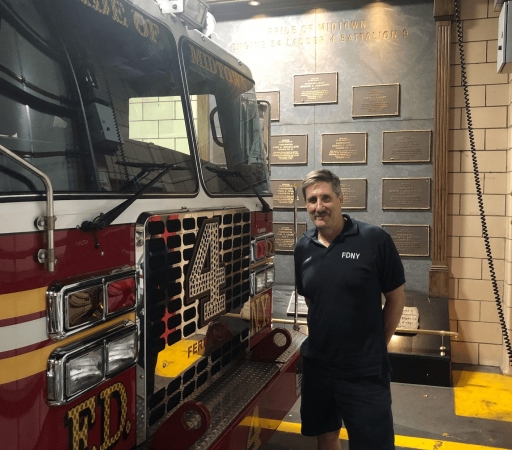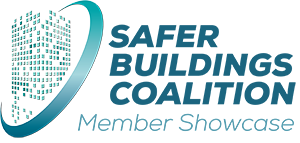
Today, October 28th, is National First Responder Day. Congress designated the day in 2017 to honor the firefighters, police officers, and EMTs that rush into a crisis when the rest of us run out. Living and working in NYC, I have many opportunities to stand and watch in awe at first responders' unimagined bravery. I've often wondered what they think when the alarm goes off. Do they worry about what they'll encounter?
"No, I don't even think about it. It's my job. It's what I've been trained to do," explained Pat Parrott, a member of FDNY's Engine 54, Ladder 4, Battalion 9 in the heart of NYC's Theater District.
Pat was kind enough to meet me at the end of his shift to answer my questions about a NYC firefighter's life. Firefighter Parrott started with the FDNY in 1995, assigned to a house in College Point Queens, but was transferred two months into his "probie" year to the "Pride of Midtown," where he's been ever since. His firehouse is well-loved in the neighborhood, and even received a Tony award in 2019 – The FDNY Engine 54, Ladder 4, Battalion 9 are more than deserving of the Tony Honor — they are an integral part of our industry, conducting inspections in our theaters, keeping thousands of theater fans and industry members safe every single day — and they have never missed a performance!
I asked Pat about two aspects of the FDNY that I've read a lot about; tradition and innovation.
"Mealtime is very big in the firehouse. Everybody gets involved in cooking for the officers, and it brings everybody together. Dinner is the biggest, but we do lunch too." I asked what was on tap for lunch, and he said he heard rumblings about sausage and peppers. Is everyone a great cook? "It depends on who's on duty." For Thanksgiving and Christmas, they go all out. Turkey, prime rib, the works.
I was happy to hear that when asked about innovation, Pat mentioned that one of the most significant improvements, since he's been on the job, is communication – namely, the Auxiliary Radio Communication Systems (ARCS) that the FDNY mandated after 9/11. "The new systems help a great deal, compared to what we worked with when I first started. Back then, you could have somebody a couple of floors above you, and you couldn't communicate. You'd actually have to communicate with the firefighters in the street, and they'd relay the information to them. It gives us a better understanding of what we're dealing with."
I asked what affects the pandemic has had on firefighting, and he said, "Of course, there are the obvious changes, like wearing masks around the public, but fighting fires in NYC, we are always dealing with traffic. These days, the volume of traffic is nothing like it was so we can respond much quicker."
Brandon joined us at one point in the conversation, a young member of the FDNY who started in November of 2016. I asked him his thoughts on his career choice. "It's the best job in the world. It gets serious at times, but I like it. It's great camaraderie, being part of a team, we're really a family—great guys and girls. You can't beat it. Other people might say, 'I have to go to work today, I say, I get to go to work today.'"
I asked Pat about the attributes that make a great firefighter. "Being outgoing helps a lot. You're always interacting with the public. But being a good person is the most important thing. And being in good shape helps."
What does a typical shift entail? "We start with roll call in front of the rigs. We have three companies, and each company has five members and an officer working on the tour. We go over our assignments for the day; for example, today, I'm operating on the outside, so if there were a fire on the third floor, I'd go up the fire escape and vent the windows. There is also an interior team responsible for forcible entry. Then, we'll do committee work, which is cleaning the house and washing the rigs. We'll go food shopping and prepare for the meal. We do drills with apparatus on the truck, like the Jaws of Life. We'll check all our tools to make sure everything is squared away."
Are there days when nothing happens? He laughed. "No. Around here, something is always going on." "The Pride of Midtown" is one of the busiest firehouses in Manhattan. They answer around 14,000 calls a year from Broadway theaters to restaurants and hotels, skyscrapers, and even assist with rescues in the Hudson River.
When our conversation was coming to a close, I asked about 9/11. "Everything seems to go back to that," Pat said. The 2001 terror attacks took the lives of 15 members of the hook and ladder crew who were among the very first responders at the World Trade Center. Pat showed me the tribute wall in the firehouse with the images of the members they lost that day. No firehouse in the city paid a heavier price on 9/11. "The whole house. We lost every member that was working that day from this firehouse."
I thanked Pat for his time and walked out of the firehouse into the busy midtown morning. I had an appointment at a nearby blood bank. Later in the day, I got an email thanking me for being a hero and a first responder. All I could think was “not even close.”
